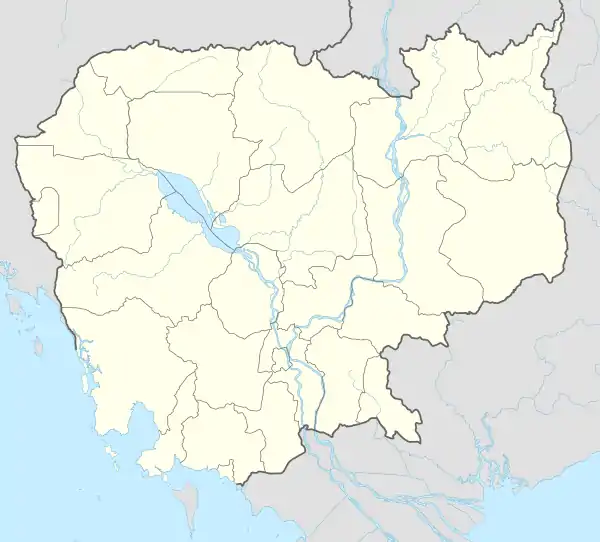| Wat Bakong វត្តបាគង | |
|---|---|
_(6962839143).jpg.webp) | |
| Religion | |
| Affiliation | Theravada Buddhism |
| Location | |
| Location | Bakong, Roluos, Siem Reap |
| Country | Cambodia |
 Shown within Cambodia | |
| Geographic coordinates | 13°20′10″N 103°58′30″E / 13.3362°N 103.97507°E |
| Architecture | |
| Completed | 1939 |
Wat Bakong (វត្តបាគង) is a Theravada Buddhist pagoda on the precincts of the Prasat Bakong in the Ruluos archeological area of the Siemreap Province.
History
In 1890, the French explorer Lucien Fournereau climbed up the Prasat Bakong and witnessed the presence of a Buddhist pagoda which sheltered ancient steles.[1]
In the 1930s, French tourists were surprised by the Brahmanic rites which continued to be celebrated in the Buddhist pagoda on top an Angkorian temple as in the nearby Preah Ko.[2]
The Wat Bakong was restructured in 1939. From the top of Wat Bakong which was going under archeological excavations and restoration, the Buddhist pagoda was displaced to the west wall of the temples precinct.
In 1960, more than twenty years after its construction, the presence of this new pagoda in the precinct of the ancient temple was still criticized as an "hideous modern pagoda that disfigures Bakong".[3]
By 2011, the perception of its presence had changed and the paintings of the pagoda, now considered valuable cultural heritage,[4] underwent restoration to restore the decoration of the pagoda as it was in 1946.[5] The restored pagoda was inaugurated on 12 December 2011, in presence of Deputy Prime Minister Sok An.
In 2020, the monks of Wat Bakong collaborated with locals authorities to protect what are considered sacred fishes from the drought that dried up the moat surrounding the temple.[6]
Architecture
The shape of the pagoda is quite unique: its has a gallery to the north and to the south and on the east side a porch nine meters long with decorated panels. In both interior and exterior panels, scenes of daily Khmer life are enterwined with elements associated to the presence of the French, during the French protectorate of Cambodia: French military, French flags, airplanes, a truck and a French bicycle.[7]
Porch
Under the porch, on the inside, seven paintings of the Vessantara Jātaka are set between the columns while on the exterior, themes of other Jātaka tales are evoked.
Interior
The paintings inside the pagoda, above and under the bays, describe stereotypical scenes of the life of the Buddha.
The roof is ornated with characters floating over clouds as well as legendary animals.
References
- ↑ Fournereau, Lucien (1890). Les ruines khmères, Cambodge et Siam: documents complémentaires d'architecture, de sculpture et de céramique (in French). E. Leroux.
- ↑ Guide touristique général de l'Indochine: guide alphabétique Taupin (in French). Édition G. Taupin. 1937. p. 195.
- ↑ École française d'Extrême-Orient (1960). Bulletin de l'École Française d'Extrême-Orient (in French).
- ↑ "Restoration of Wat Bakong completed". nationthailand. 18 December 2011. Retrieved 22 January 2022.
- ↑ Guéret, Danielle; Guéret, Dominique Pierre (2017). La Pagode khmère: Les cent plus anciens sanctuaires du Cambodge...et quelques autres (in French). KAM éditions. p. 140. ISBN 978-9924-9037-3-4.
- ↑ "Drought threatens sacred fish at Bakong temple - Khmer Times". 10 June 2020. Retrieved 22 January 2022.
- ↑ Guéret, Danielle; Guéret, Dominique Pierre (2017). La Pagode khmère: Les cent plus anciens sanctuaires du Cambodge...et quelques autres (in French). KAM éditions. p. 140. ISBN 978-9924-9037-3-4.
Bibliography
- Roveda, Vittorio (2011). The Restoration of Wat Bakong Murals in Cambodia. Holcim. ISBN 978-99963-644-0-2.
